Final report for YENC25-240
Project Information
The Garden Club Project aimed to educate youth on sustainable agriculture by providing hands-on experiences in urban farming, gardening, and composting. Through interactive lessons, students learned ecologically sound practices such as soil health, water conservation, and sustainable crop growth. The program also introduced financial literacy and entrepreneurship, highlighting economically viable pathways in agriculture. Youth explored careers in farming, environmental stewardship, and food systems, emphasizing socially responsible practices that benefit their communities. The project fostered practical skills, environmental awareness, and career readiness in the next generation of agricultural leaders.
1) What we taught youth about sustainable agriculture
The Garden Club Project educated youth on sustainable agriculture through hands-on urban farming, gardening, and composting. Students learned ecologically sound practices including soil health, water conservation and sustainable crop growth . The program also introduced financial literacy and entrepreneurship. Participants were introduced to budgeting, pricing, and simple cost-of-goods. Students recognized economically viable pathways in agriculture. Career awareness covered farming, environmental stewardship, and food systems roles, emphasizing socially responsible practices that benefit local communities.
2) Educational approach used and youth learning outcomes
- Experiential learning in garden plots and a high tunnel, reinforced by short mini-lessons and reflection journals.
- Inquiry-based investigations (soil and water tests) tied to real farm decisions.
- Team roles (grower, data lead, marketing lead) to practice collaboration and accountability.
- “Grow–Cook–Sell” cycle linking science, nutrition, and entrepreneurship.
Learning outcomes:
- Knowledge: Students explained soil health, composting stages, and irrigation
- Skills: Youth demonstrated safe tool use, transplanted and harvested produce, created basic budgets, and pitched products.
- Dispositions: Participants reported increased environmental awareness, confidence speaking to customers, and interest in ag/STEM careers.
- Community: Teams applied food-safety basics and donated or sold produce through local farmers markets.
3) Succinct statement of conclusions
The program built practical growing skills, scientific literacy, and early entrepreneurship readiness. Pairing fieldwork with data, reflection, and real sales/donations increased relevance and retention. Youth left more confident, more career-aware, and more committed to environmentally responsible practices that strengthen local food systems.
4) Adoption actions by youth, educators, and parents
Youth:
- Established watering schedules and created crop plans for the next season.
- Formed a student garden committee to maintain beds and lead peer tours.
Educators:
- Integrated garden journaling and NGSS/Ohio science-aligned investigations.
- Planned monthly taste-test tied to harvests.
Parents/Caregivers:
- Built at-home container gardens; reported reduced produce costs.
- Volunteered for harvest days and market tables
The major sustainable agriculture education goals we plan to accomplish during the project are:
- Develop Agricultural Skills: Use hands-on gardening, hydroponics, and mushroom growing to teach ecologically sound farming techniques, showing how to maintain soil health and conserve water.
- Promote Environmental Stewardship: Engage youth in sustainable practices like composting and waste reduction, helping them understand the ecological impact of their actions and making farming economically viable.
- Encourage Entrepreneurship: Teach financial literacy through farm-to-market projects, emphasizing how small-scale agriculture can be both economically viable and socially responsible by supporting local communities.
Educational & Outreach Activities
Participation Summary:
Objective 1: Develop Agricultural Skills
Activity 1: Introduction to Urban Farming
-
- Date: June & July 2025
- Participants: Youth ages 14-18
- Participant #: 60
- What The Garden Club Project Will Do: Kick-off the program by introducing youth to urban farming basics, including an overview of sustainable agriculture. Hands-on activities will focus on garden bed preparation, planting techniques, and an introduction to soil health.
- Activity 2: Mushroom Growing Tutorial
- Date: July 2025
- Participants: Youth ages 12-14
- Participant #: 45
- What The Garden Club Project Will Do: Youth will learn how to grow mushrooms using a sustainable mushroom kit. Te'Lario Watkins of Tiger Mushroom Farms will lead the session, explaining the mushroom life cycle, the importance of decomposers in agriculture, and how mushroom farming is an eco-friendly practice that can be done in small spaces.
Objective 2: Promote Environmental Stewardship
- Activity 3: Earth Day Event; Composting and Waste Reduction
- Date: April 2025
- Participants: Youth ages 11-17
- Participant #: 30
- What The Garden Club Project & Compost Exchange: Students will learn how to create compost from kitchen scraps, yard waste, and other organic materials. This lesson will cover the science behind decomposition, carbon-to-nitrogen ratios, and how composting improves soil fertility. The hands-on component will involve setting up a composting system for the garden, with participants learning how to monitor moisture, turn compost, and apply it to garden beds. Emphasis will be placed on reducing waste and the positive ecological impact of composting.
- Presentation by Te'Lario Watkins II and special guest Kendall Rae Johnson ( Youngest certified farmer in America)
Objective 3: Encourage Entrepreneurship
- Activity 4: Farm-to-Market Project
- Date: June 10 – (Ongoing)
- Participants: Youth ages 16-18
- Participant #: 30
- What The Garden Club Project Will Do: This long-term project will teach youth how to harvest crops, prepare them for sale, and engage with local farmers' markets. Participants will learn financial literacy by budgeting for garden supplies, tracking income from produce sales, and calculating profitability. They will also explore branding, marketing, and customer service skills, promoting their products as eco-friendly and locally grown.
Objective 4: Explore Career Options
- Activity 5: Careers in Agriculture Interview
- Date: November 2025
- Participants: Youth ages 10-18
- Participant #:10
- What The Garden Club Project & Solomon Garner ( Youth Advocate Leader) : This interview discussion will feature local farmers, urban agriculture experts, and environmental advocates. Youth will have the opportunity to learn about different career pathways in sustainable agriculture, food systems, environmental science, and entrepreneurship. The interview will highlight real-world experiences and emphasize how socially responsible practices can lead to fulfilling and impactful careers.
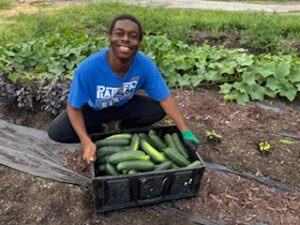
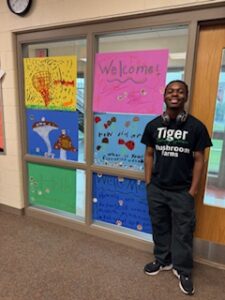
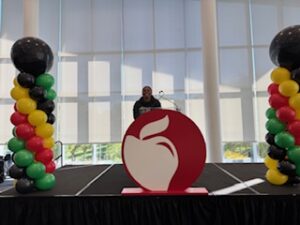
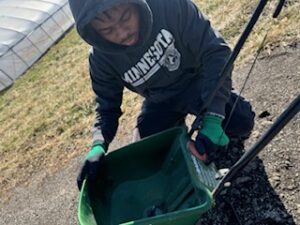
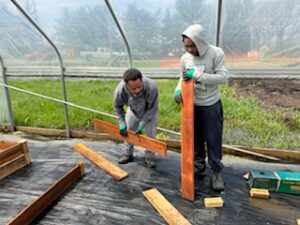
- Host webinar or in-person workshop
- Series of short videos and/or social media posts
Learning Outcomes
Youth reported changes in their knowledge of how food grows and what is recommended for our Zone.
Youth reported learning about different jobs in farming like mushroom growing, soil testing and composting.
Youth reported a change in their attitude about growing food. Some had never gardened before , but want to come back and volunteer again.
Youth learned the proper way to water plants ( at the roots).
Youth participating in the program gained information about what food grows in our Zone and how to grow warmer climate produce in high tunnels. They learned about soil health and that seedlings need to be cared for everyday to support their growth. Youth are beginning to learn that farming is more than digging in the dirt. They learned about technology like drones and FarmBots they help farmers grow their crops.
The participants helped harvest over 225 lbs of produce this summer. Most of the produce was sold to a local food pantry and some was donated to a local Early Care site for their Farm to Early Care and Education program.
Te'Lario used his lesson plan about the Life Cycle of the Mushroom. He shared the different stages of the mushroom from spore to mature mushroom. He talked about the temperature and humidity needed to grow mushrooms and common issues when growing inside. Students had a chance to see mushrooms at different stages and identify other common mushrooms. Students were given a quiz at the end and did great!!
Lesson Plan:
https://docs.google.com/document/d/1RI51mpytmc4RUir3BY_FkKyGOhrzoW_A5HaifSfaQEQ/edit?usp=sharing
The mushroom life cycle lesson featuring Te’Lario’s Amazing Mushroom Farm introduces students to the fascinating world of fungi while inspiring them through Te’Lario’s real-life story as a young farmer and author. The 45-minute lesson begins with Te’Lario reading a short passage from his book, sparking curiosity about how mushrooms grow and why they are important to the environment. Students learn that mushrooms are not plants but fungi, and they play a crucial role in nature as decomposers, breaking down dead materials like leaves and logs to recycle nutrients back into the soil.
Using visuals, Te’Lario explains each stage of the mushroom life cycle — spores, mycelium, hyphae, fruiting body, and spore release — emphasizing how each stage connects to real-life mushroom farming. Through discussion, students explore questions such as what would happen if decomposers disappeared and how mushrooms help the Earth stay healthy.
Extension Activity: Students then complete an engaging hands-on activity using a Mushroom Life Cycle Worksheet, where they draw and label each stage and write a short reflection about how mushrooms help recycle nutrients. The lesson concludes with Te’Lario sharing how his journey began with curiosity and a simple science fair project, connecting science to entrepreneurship and sustainability.
By the end of the lesson, students not only understand the mushroom life cycle but also see how scientific curiosity can lead to positive community impact, innovation, and environmental stewardship making science meaningful and inspiring for young learners.
Project Outcomes
We have increased support from the community coming to volunteer at the urban farm.
Parents and students who attended our Earth Day Learning Fair learned about composting and how they can compost at home. They learned the benefits of composting and left with next steps to start and/or resources for the future.
We hosted 15 tenth graders at our urban farm in July. Three of the students LOVED the experience so much they want to come back and volunteer. Two of the students shared that this was their 1st time gardening!!! They are excited to come back and learn more about growing their own food.
In the future, we will market our Earth Day Learning Fair to more people. We had great vendors and workshops , but we could have increased the attendance with more effective marketing.